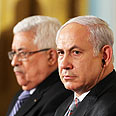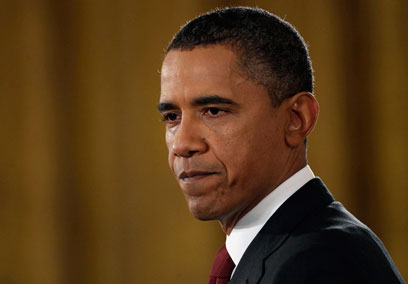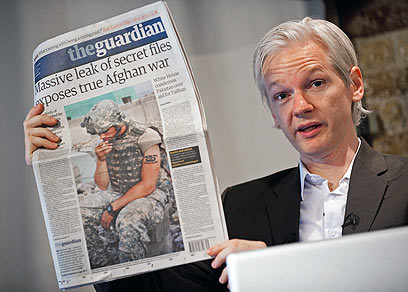
Peace talks hit dead-end
Photo: AFP
The benefit package to Israel
in exchange for a three-month settlement moratorium in a bid to secure quick agreement on the borders of a Palestinian state was outlandish to begin with. It is therefore a good thing that the deal did not materialize. It was destined to end up leading to an explosion whose results, for all sides, would have been worse than not holding negotiations at all.
The deal had no chance, mostly because it was premised on the US Administration's false assumption that both Abbas and Netanyahu are mentally willing to and politically capable of agreeing on a historical compromise on at least one of the five core issues.

Deal with Obama falls through (Photo: Reuters)
With typical American naïveté, Obama and his advisors bought into the promises of the Middle Eastern partners and believed that three months would suffice to finalize an agreement in principle on what Netanyahu and Abbas whispered behind closed doors. The Americans failed to understand that in the Middle East one not always means what one promises, and even if the intention is there, there is no ability to implement it.
The second reason for the deal's inherent futility was the simple technical fact that it's impossible to draft a map of the Israel-Palestine borders within three months, even if both sides arrived at the negotiation table in good faith and with willingness to compromise. Even if Israel was willing to accept in principle the Palestinian demand for a map to be premised on the 1967 borders with small modifications, much time would be required in order to agree on the details of drafting such map.
After all, the Palestinians require "quality land" in exchange for settlement blocs to remain under Israeli sovereignty, and Israel on its part demands that the borders meet strict security criteria. These demands cannot be accommodated during a marathon session and under threat that the Palestinians would quit the talks once the three-month freeze ends.
Scent of a bribe
And we have not yet mentioned the heavy scent of disproportional political bribe that emanated from the US benefit package. It's easy to imagine what would have happened had the talks hit an impasse after three months, with the US already committed, in writing, to all its pledges to Israel. Under such circumstances, even if the Palestinians were at fault, Israel would have been perceived in the US and in global public opinion as the party that was paid off but didn't deliver the goods.While we should not be overly upset that this odd deal did not materialize, we must recognize the heavy damage caused to the US and to Israel as result of the failure. America's inability to force its will upon Israelis and Palestinians gravely erodes its image as a superpower and its Middle Eastern status.
This erosion is especially grave because this failure comes on the heels of a series of other diplomatic failures experienced by Washington as of late. This includes its helplessness vis-à-vis China's economic and environmental policies, its failure in curbing North Korea's adventurous policy, and the WikiLeaks affair. Yet when the US is perceived as a paper tiger, its satellite state, Israel, also suffers grave erosion in its deterrent power and ability to cope with challenges in the international theater.

WikiLeaks reports hurt America (Photo: AFP)
Officials in Washington halfheartedly admit that the Palestinian insistence on a continued freeze in the settlements and in Jerusalem as a condition for direct talks is the main reason for the failure. However, on the international stage, Israel is perceived as the guilty party.
Global public opinion has no time for or desire to deal with the nuances. The international media highlighted the fact that Israel did not agree to a three-month moratorium. This fact enables the Palestinians to produce a wave, which will keep growing, of recognition for their demand for a state within the1967 borders, thereby boosting Israel's international isolation. This isolation will serve as a great obstacle for Israel in managing an effective war should we see a flare-up on the northern border; this issue is already adding fuel to the de-legitimization fire burning under our feet.
The vacuum created in the wake of the American initiative's failure invites trouble. One possibility is a Palestinian initiative aimed at securing recognition for a state within the 1967 borders at the UN Security Council. The US and possibly the Europeans would veto such resolution, yet the Palestinians can turn to the US General Assembly and elicit the support of a significant majority of member states. Israel will then be forced to go on the defense and adopt reprisals that would further boost its isolation.
Simultaneously, we may see violent unrest, which already exists to a limited degree, in Judea and Samaria. Experience shows that when the Palestinians lose hope for changing their political situation, they tend to boost their Bil'in-style "soft violence," which may end up spiraling into major violence, possibly with Abbas' encouragement.

Palestinian violence feared (Photo: AP)
Moreover, we must recognize the fact that every passing day boosts the danger that ultimately we'll have to live in a bi-national state. This will happen either because accelerated construction in the territories won't allow for a separation of the Palestinian and Jewish populations, or because Abbas will decide to quit and Israel will lose the only partner it can still effectively negotiate with on realizing the two-state doctrine.
3 options
In order to avoid all this, the US and Israel must seek a new outline for a diplomatic process, following a short break. For the time being, the Palestinians, as they tend to do, remain passive, reinforce their sense of victimization, and wait for others to pull the chestnuts out of the fire for them. Hence, there is no point in expecting Palestinian initiative here. There are three main options for such process:
- Resuming indirect negotiations between Israel and the Palestinians with US mediation yet without a timeframe. This move would aim to see both sides presenting US mediators with their minimal demands and maps. On the basis of this, the US would produce a compromise offer for a comprehensive agreement accompanied by a map, and attempt to force it upon the sides. The risk here is that the sides won't accept the US offer and the damage to the US and Israel in rejecting this proposal would be even greater than the one caused as result of the latest initiative's failure.
- Another option is a shift from a process of negotiations on a comprehensive deal to a process of talks aimed at securing a long-term interim agreement in the West Bank. The upside of this option is that it will not require Israel to uproot some 80,000 settlers from Judea and Samaria at once, while the Palestinians have to force the agreement upon Hamas in Gaza.
- A third option is unilateral Israeli moves aimed at improving the economic condition of Palestinians in the territories and partly satisfying their political aspirations. This would be done by handing over extensive territory to the Palestinian Authority, removing roadblocks, and easing the terms for employment in Israel. Such steps may prevent violent unrest in the territories and create an atmosphere that would allow Abbas and Netanyahu – with or without US mediation – to engage in secret talks similar to the ones managed by the previous Israeli government. There is no doubt that the negotiation tactic adopted by Olmert and Livni served Israel well. The two managed to engage in substantive talks with the Palestinians and create a convenient international climate for Israel, while pushing Abbas into a defensive posture where he rather than Israel had to explain why negotiations failed. For Netanyahu, this option includes a major upside, as it will allow him to negotiate without being monitoring by his rightist government partners and far-right elements until the time comes for truly major decisions.
Each one of the above options presents both advantages and risks. However, a vacuum in the diplomatic process between us and the Palestinians is without a doubt the worst option. For that reason, we must not waste time. Jerusalem, and mostly Washington, must quickly draw the lessons of the "negotiations under freeze" initiative and embark on a new path.
- Follow Ynetnews on Facebook















